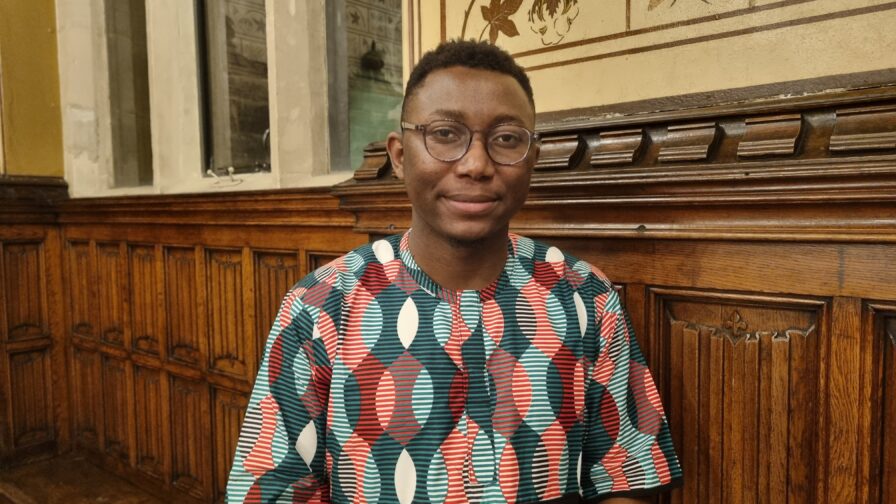What do you think could be better when it comes to the heritage and the different histories that are currently being shared in Greater Manchester?
First, I think this is a laudable project. I think it’s a good idea to try to be as inclusive as possible, right? So to ensure that things are inclusive, I think you need to ensure that every voice is heard. Now, how do you ensure that every voice is heard? That is by going to the places that represent different voices.
So for us [Caring and Sharing Rochdale], that could be like visiting grassroots organisations like ours, organisations that are connected to the people, organisations that understand the people, organisations that represent different backgrounds.
I imagine there are some spaces where you are not likely to find some set of people just because they probably feel like they do not belong there. So if you want to capture all voices then consider all the places where [they might be]. For example, Black people, you might not find Black people in some settings, but you’re likely to find them in some others, right? So if you say, just off the top of my head, if you’re going, for example, to visit the pub, you’re likely to find some groups there and not others. There are some places where other groups, whose voices you are trying to capture, where they are likely to be, just to ensure that there is that inclusivity.
If everybody was to feel completely represented in the histories that are being shared in Greater Manchester, what would that look like to you?
First, I could go the philosophical way and say that it might be practically impossible for everyone to feel a sense of equal representation, right? The best we can do is try. So first I think it’s important to kind of look at history, look at how things have evolved over time. See the different people who have contributed at one point or the other to the development of Greater Manchester.
But that involves going beyond what is popular. Because I mean, what is the popular narrative sometimes might not necessarily be factual. Tonight’s event is about reclaiming narratives, like telling some stories that have been told in a certain way differently, to include many of the things that had actually happened. For example, we’ve got trains. Who were those involved in building the tracks?
Let’s say we have a building like this [Rochdale Town Hall]. A building like this could be a powerful place to represent diverse cultures, right? So we could, for example, have some portraits or something in this room, with the different groups of people who have at some point or another contributed to the development of Rochdale and by extension, Greater Manchester. So yeah, I guess that would be something, so that, as people visit this historic place, they see all those who have been involved in the making of that history or who have shaped it into being what it is today.
What are the steps that you and your organisation are taking towards that?
What we are doing is to ensure every voice is heard and bring the community together. So one of the key things that we believe in is cultural representation. Of course, we all agree there is strength in diversity.
Right now, our Black History Month event is one of those ways by which we try to involve everyone. So as the CEO would say, it’s a Black History Month event but it is open to everyone. It is to bring the community together, to foster community cohesion, social cohesion, to help all of us feel like we are one. We belong together. So yeah, that’s one. We have got different cultural celebrations.
Another thing we do is global cooking. We organise global cooking events where people cook recipes from different parts. So we’ve got this set of people who have their dishes, and that other set who’ve got their own dishes, and they come together and teach each other how to make different things. It helps with cohesion and representation of diverse cultures.
Is there any individual or group that’s doing work that you admire in that space of representation and heritage?
In terms of a group that’s trying to ensure that others who might be historically underrepresented, there’s this group called Mamas. It’s a group of 10 organisations who represent women. The fact is that in terms of gender, the gender balance tips towards male rather than female, so Mamas represents women. They give women a voice, women in all spheres of life. Mamas is an organisation that empowers them, creates different initiatives and Caring and Sharing is proud to be a member of Mamas. Our CEO is one of the 10 founding women of Mamas.
Is there anything you need from others to help you in the mission that you and Caring and Sharing are trying to achieve?
I think if I were to use one word, I would say listen. We all need to listen more, right? Even when we speak to one another. I mean, there are many times when someone speaks to you, rather than listen to them, you’re actually processing what you would say, right? Because you want to say the right things. But we’ve got to calm down and actually listen, hear what people have got to say and hopefully get to understand them a bit more.
Learn more about the Greater Manchester’s collective heritage project here. If you’d like to take part, email us at editor@themeteor.org.
Sign up to The Meteor mailing list – click here
The Meteor is a media co-operative on a mission to democratise the media in Manchester. To find out more – click here
Featured image: Alice Toomer-McAlpine


Leave a Reply